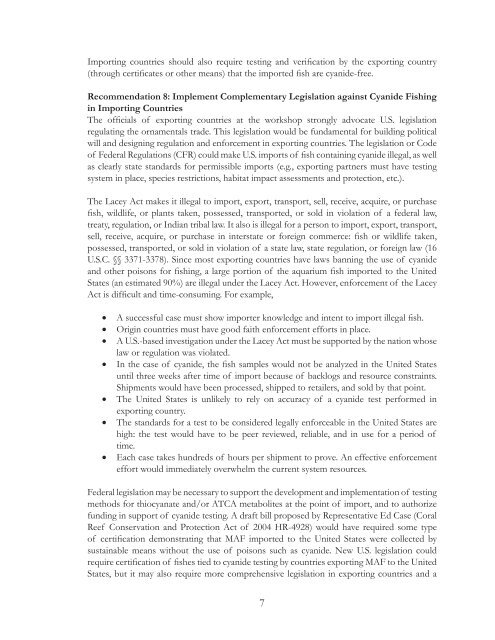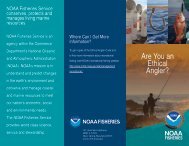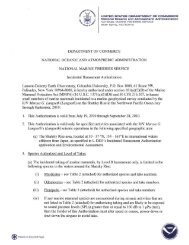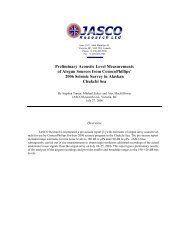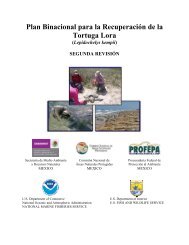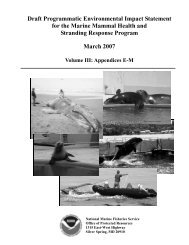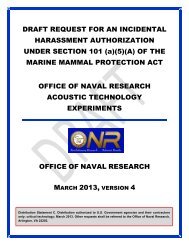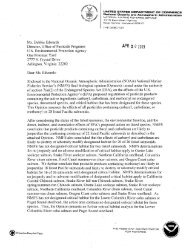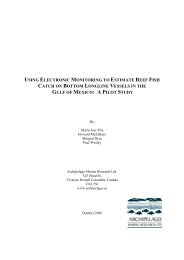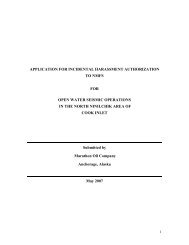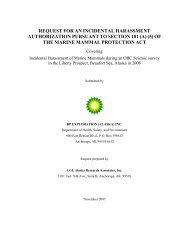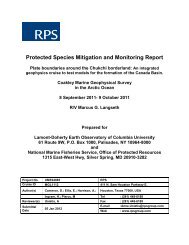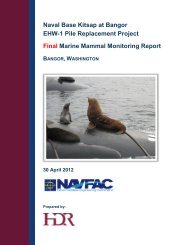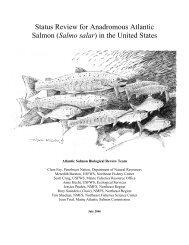Proceedings of the International Cyanide Detection Testing Workshop
Proceedings of the International Cyanide Detection Testing Workshop
Proceedings of the International Cyanide Detection Testing Workshop
You also want an ePaper? Increase the reach of your titles
YUMPU automatically turns print PDFs into web optimized ePapers that Google loves.
Importing countries should also require testing and verifi cation by <strong>the</strong> exporting country<br />
(through certifi cates or o<strong>the</strong>r means) that <strong>the</strong> imported fi sh are cyanide-free.<br />
Recommendation 8: Implement Complementary Legislation against <strong>Cyanide</strong> Fishing<br />
in Importing Countries<br />
The <strong>of</strong>fi cials <strong>of</strong> exporting countries at <strong>the</strong> workshop strongly advocate U.S. legislation<br />
regulating <strong>the</strong> ornamentals trade. This legislation would be fundamental for building political<br />
will and designing regulation and enforcement in exporting countries. The legislation or Code<br />
<strong>of</strong> Federal Regulations (CFR) could make U.S. imports <strong>of</strong> fi sh containing cyanide illegal, as well<br />
as clearly state standards for permissible imports (e.g., exporting partners must have testing<br />
system in place, species restrictions, habitat impact assessments and protection, etc.).<br />
The Lacey Act makes it illegal to import, export, transport, sell, receive, acquire, or purchase<br />
fi sh, wildlife, or plants taken, possessed, transported, or sold in violation <strong>of</strong> a federal law,<br />
treaty, regulation, or Indian tribal law. It also is illegal for a person to import, export, transport,<br />
sell, receive, acquire, or purchase in interstate or foreign commerce: fi sh or wildlife taken,<br />
possessed, transported, or sold in violation <strong>of</strong> a state law, state regulation, or foreign law (16<br />
U.S.C. §§ 3371-3378). Since most exporting countries have laws banning <strong>the</strong> use <strong>of</strong> cyanide<br />
and o<strong>the</strong>r poisons for fi shing, a large portion <strong>of</strong> <strong>the</strong> aquarium fi sh imported to <strong>the</strong> United<br />
States (an estimated 90%) are illegal under <strong>the</strong> Lacey Act. However, enforcement <strong>of</strong> <strong>the</strong> Lacey<br />
Act is diffi cult and time-consuming. For example,<br />
•<br />
•<br />
•<br />
•<br />
•<br />
•<br />
•<br />
A successful case must show importer knowledge and intent to import illegal fi sh.<br />
Origin countries must have good faith enforcement efforts in place.<br />
A U.S.-based investigation under <strong>the</strong> Lacey Act must be supported by <strong>the</strong> nation whose<br />
law or regulation was violated.<br />
In <strong>the</strong> case <strong>of</strong> cyanide, <strong>the</strong> fi sh samples would not be analyzed in <strong>the</strong> United States<br />
until three weeks after time <strong>of</strong> import because <strong>of</strong> backlogs and resource constraints.<br />
Shipments would have been processed, shipped to retailers, and sold by that point.<br />
The United States is unlikely to rely on accuracy <strong>of</strong> a cyanide test performed in<br />
exporting country.<br />
The standards for a test to be considered legally enforceable in <strong>the</strong> United States are<br />
high: <strong>the</strong> test would have to be peer reviewed, reliable, and in use for a period <strong>of</strong><br />
time.<br />
Each case takes hundreds <strong>of</strong> hours per shipment to prove. An effective enforcement<br />
effort would immediately overwhelm <strong>the</strong> current system resources.<br />
Federal legislation may be necessary to support <strong>the</strong> development and implementation <strong>of</strong> testing<br />
methods for thiocyanate and/or ATCA metabolites at <strong>the</strong> point <strong>of</strong> import, and to authorize<br />
funding in support <strong>of</strong> cyanide testing. A draft bill proposed by Representative Ed Case (Coral<br />
Reef Conservation and Protection Act <strong>of</strong> 2004 HR-4928) would have required some type<br />
<strong>of</strong> certifi cation demonstrating that MAF imported to <strong>the</strong> United States were collected by<br />
sustainable means without <strong>the</strong> use <strong>of</strong> poisons such as cyanide. New U.S. legislation could<br />
require certifi cation <strong>of</strong> fi shes tied to cyanide testing by countries exporting MAF to <strong>the</strong> United<br />
States, but it may also require more comprehensive legislation in exporting countries and a<br />
7


